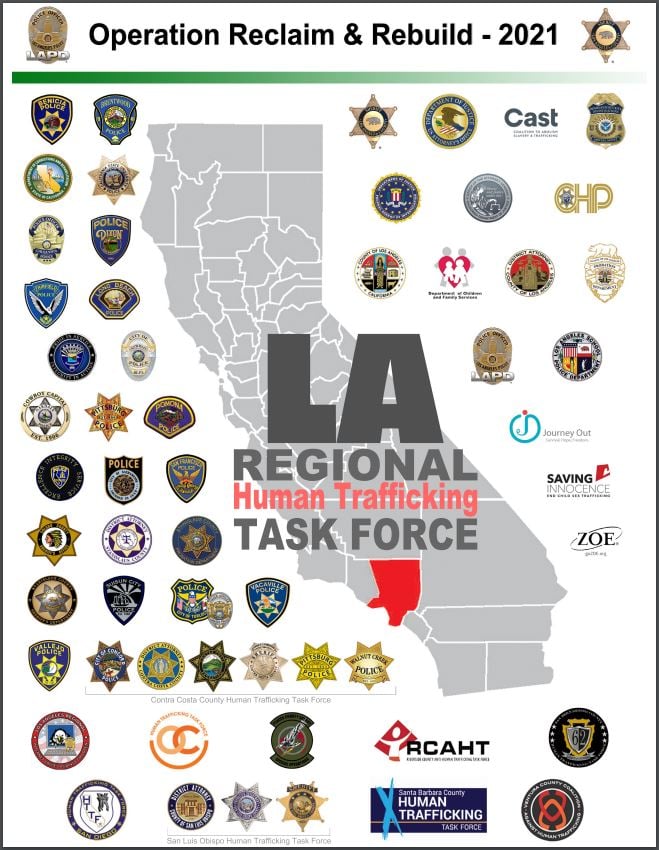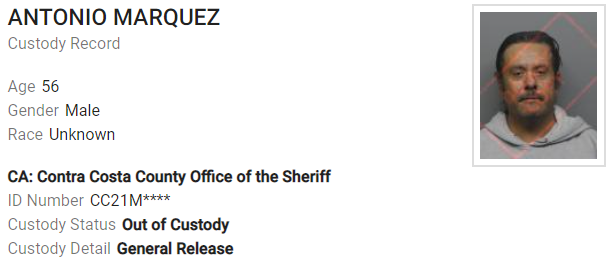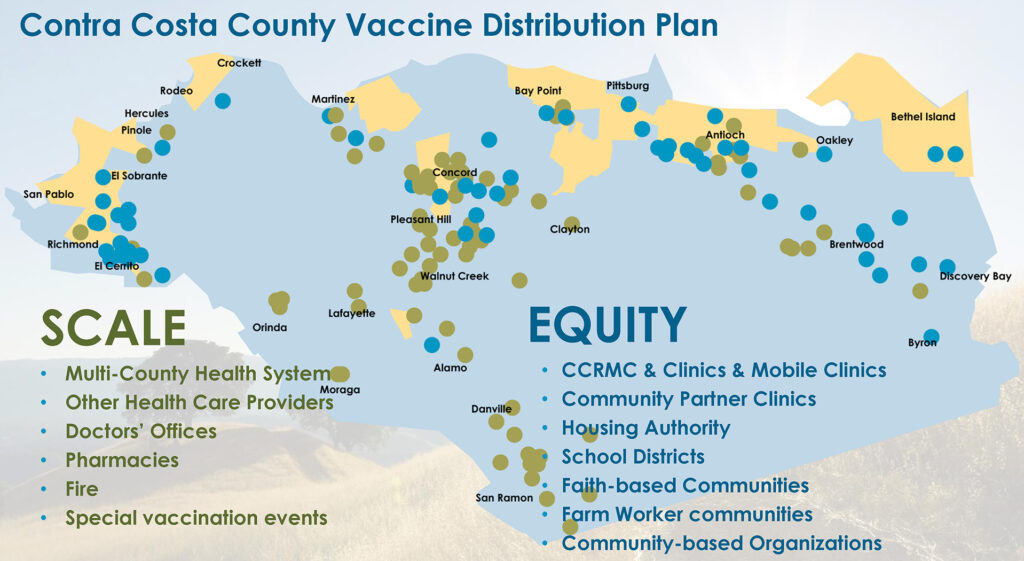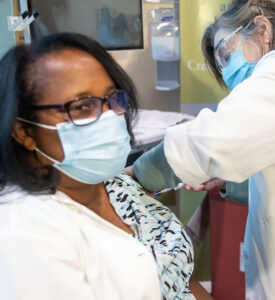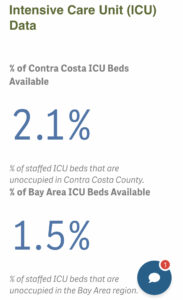Dozens rescued, hundreds arrested
By Pittsburg Police Department
On January 29th, in conjunction with Human Trafficking Awareness Month, Pittsburg Police Department personnel took part in a statewide human trafficking operation. Operation Reclaim and Rebuild is an annual multi-agency initiative that focuses on rescuing victims of human trafficking, providing victims with much-needed services, and identifying and arresting their captors. Police agencies and other trafficking task forces throughout the state joined in the operation this year to continue a no tolerance focus on human trafficking and sex crimes.
This year, the Pittsburg Police Department joined with the Contra Costa County Human Trafficking Task Force, and over 100 other agencies throughout the state of California to combat Human and Sex Trafficking. This statewide Task Force is an example of how individual law enforcement agencies can work together to be more effective when they join together.
As the operation took place throughout the state, Pittsburg Police Detectives were hard at work in our own community, making three arrests related to human trafficking crimes. In addition, several other suspects in human trafficking cases were identified. These arrests are part of the over 450 arrests and 39 rescues that were made throughout the statewide operation.
We were proud to do our part in making Operation Reclaim and Rebuild a big success in Contra Costa County.
Read More
At their Board meeting on February 2, 2021, the Contra Costa County Board of Supervisors unanimously passed Urgency Ordinance No. 2021-04 that continues a temporary eviction moratorium for certain residential tenants and a moratorium on certain residential rent increases through June 30, 2021. The Urgency Ordinance also continues a temporary eviction moratorium for certain commercial tenants through March 31, 2021. Ordinance No. 2021-04 supersedes Ordinance No. 2020-29.
“Even as COVID-19 vaccines distribution gives us hope to ending the pandemic, we recognize the need to continue protections for Contra Costa residents and businesses,” said Supervisor Diane Burgis, Board Chair. “Now is not the time to let down our guard against the virus. We encourage residents to stay vigilant and to seek resources. We will get through this together.”
Read the full document Ordinance No. 2021-04 (PDF). Find answers to Frequently Asked Questions (FAQs) regarding this ordinance on the County website soon.
For information and resources, visit Contra Costa County at www.contracosta.ca.gov. For COVID-19 updates, visit Contra Costa Health Services at cchealth.org/coronavirus. If you have questions about the coronavirus, contact the multilingual Call Center at 1-844-729-8410, open daily from 8 am to 5 pm. For assistance after hours in multiple languages, please call 211 or 800-833-2900 or text HOPE to 20121.
Read MoreBy Timothy Leung, Public Information Officer, 4CD
 In a report to the Contra Costa Community College District (District), the Accrediting Commission for Community and Junior Colleges, Western Association of Schools and Colleges (Commission) has announced continued full accreditation of the District’s three colleges, but has also issued a warning to the District. The warning is the lightest sanction level that can be issued; however, District leadership has already started working on serious solutions. Five concerns have been raised by the Commission, four of them connected to Governing Board behavior that was widely reported by local media throughout 2020.
In a report to the Contra Costa Community College District (District), the Accrediting Commission for Community and Junior Colleges, Western Association of Schools and Colleges (Commission) has announced continued full accreditation of the District’s three colleges, but has also issued a warning to the District. The warning is the lightest sanction level that can be issued; however, District leadership has already started working on serious solutions. Five concerns have been raised by the Commission, four of them connected to Governing Board behavior that was widely reported by local media throughout 2020.
“I applaud our colleges who are doing tremendous work to increase the success of our students,” says Chancellor Bryan Reece. “To be clear, the Commission’s findings have nothing to do with teaching or our ability to provide the support our students need. Nevertheless, we accept the findings and are ready to roll up our sleeves and begin the hard work in addressing the areas of improvement around District governance.”
The five areas of improvement are:
- Standard III.A.5 (District Requirement 1): In order to meet the standard, the Commission requires that the District develop a process by which all classified employees are regularly and systematically evaluated.
- Standard IV.C.3 (District Requirement 2): In order to meet the standard, the Commission requires the Governing Board should follow its Board policy related to the Chancellor’s evaluation process.
- Standard IV.C.7 (District Requirement 3): In order to meet the standard, the Commission requires the Governing Board act consistently with its adopted policies and bylaws, and regularly assesses these policies and bylaws.
- Standard IV.C.11 (District Requirement 4): In order to meet the standard, the Commission requires the Governing Board uphold and adhere to their adopted code of ethics policy-BP 1010.
- Standard IV.C.12 (District Requirement 5): In order to meet the standard, the Commission requires the Governing Board delegate full responsibility and authority to the Chancellor to implement and administer board policies without board interference and hold the Chancellor accountable for the operation of the District and colleges.
“The Governing Board and our community members have been frustrated with these issues for a while and we take these findings seriously,” says Board President Andy Li. “We have already begun working together to address these issues, and I am confident the trustees will continue making progress toward addressing the Commission’s areas of improvement.”
With four of the five areas for improvement attached to the Governing Board, and one to the District Office, the Commission did not find areas of concern in the three colleges. In fact, Diablo Valley College and Los Medanos College were officially commended for best practices.
Diablo Valley College received a Commendation for exceeding the following accreditation standard:
Standards I.B.5, II.A.2, II.C.1 (College Commendation 1): The Commission commends the College for its use of data to assess the accomplishment of its mission through its program review process in order to continuously improve courses, programs, and student services.
Los Medanos College received a Commendation for exceeding the following accreditation standard:
Standard III.A.14 (College Commendation 1): The Commission commends the College for its robust offering of professional development opportunities in support of its mission, vision, values, and strategic initiatives based on the use of data throughout College processes, including equity-centered practices.
A summary report highlighting the District’s progress in addressing the five areas is due to the Commission by October 2021, followed by a site visit from a peer review team to ensure continued progress is being made.
The Commission conducts accreditation for all community colleges in California (and other areas as well). Colleges are evaluated on a six-year cycle, and will soon transition to a seven-year cycle. During these comprehensive evaluations, the Commission also includes a review of the District Office and Governing Board, but their accreditation decision is applied to the colleges themselves.
About the College District
The Contra Costa Community College District (District) is one of the largest multi-college community college districts in California. The District serves a population of 1,019,640 people, and its boundaries encompass all but 48 of the 734-square-mile land area of Contra Costa County. The District is home to Contra Costa College in San Pablo, Diablo Valley College in Pleasant Hill, Los Medanos College in Pittsburg, as well as educational centers in Brentwood and San Ramon. The District headquarters is located in downtown Martinez.
Read MoreBy Hercules Police Department
On January 29, 2021, at 11:19 am, an officer located a vehicle associated with multiple thefts from The Home Depot throughout the state.
On January 28, 2021, Hercules Officers were alerted of a suspect known throughout the state to steal items from The Home Depot and then make returns on some of the items stolen to make back the money for the purchased item. The Home Depot has been working cases for this suspect for over three years and believes he has stolen over $4.5 million from The Home Depot. Since September of last year, it is confirmed that the suspect had stolen over $500,000 from multiple different Home Depot stores up and down the west coast.
An officer located the suspect vehicle, a 2006 Ford Econoline Van, backed into a 1500 Sycamore Avenue parking stall. Officers waited for the man, identified as Miguel Alderete, age 49 of Hercules and Los Angeles, to return to his vehicle, where he was contacted and detained. His vehicle’s search resulted in approximately $10,000 of stolen merchandise from The Home Depot in the van. The occupants of the van were arrested and transported to jail.
A multi-state organized retail theft crew was apprehended after four years of stealing from The Home Depot. The estimated loss during that time is about $4.5 million. This crew averages about $105,000 per month in thefts.
After eluding multiple agencies, Hercules Police were able to catch the culprits, including a second suspect, identified as Antonio Marquez, age 56 from Southern California, in a shopping center across from The Home Depot. The crew had approximately $10,000 of merchandise in their possession from thefts that day in Tracy, Fairfield and Vallejo.
Allen Payton contributed to this report.
Read More
Less than 5% immunization compared to 11-13.8% in Alamo, Lafayette and Walnut Creek where the population is older.
The county is distributing the vaccine primarily to residents 75 years and older, said Contra Costa County Health Officer Dr. Chris Farnitano – “I really do believe we are at the turning of the tide of this pandemic at this point.”
Annual Board Retreat held virtually
By Daniel Borsuk
During the Contra Costa Board of Supervisors annual retreat Tuesday, Jan. 26, the county’s top health official made a major admission, saying her department will investigate questions into claims of unequal distribution of COVID-19 vaccination injections in areas with high populations of Black and Latino residents.
Contra Costa Health Services Director Anna Roth was put in the hot seat by District 1 Supervisor John Gioia who, like last week, raised similar questions as to why the COVID-19 vaccine is being unequally distributed in the district he represents. His district includes the cities of Richmond and El Cerrito and other communities with high percentages of minorities who are more prone to be stricken with coronavirus, than in other communities that tend to be wealthier and have higher percentages of white residents.
Gioia also cited other high percentage minority communities like Antioch, Bay Point, and Pittsburg in supervisorial District 5 for exposing residents to the COVID-19. District 5 is represented by Supervisor Federal Glover of Pittsburg who did not comment on the issue.
Gioia said the vaccination rate in Antioch is five percent, in Bay Point it is 4.3 percent, in Richmond it’s 4.5 percent, while in Alamo the vaccination rate is 11 percent, 12 percent in Lafayette, and 13.8 percent in Walnut Creek.
“You make a very important point. The early data is showing an inequity,” Health Director Roth said. “We hear your request for a more specific plan.”
Last week, when Gioia raised the same inequity issue, Roth did not acknowledge the Supervisor’s issue as significant enough for possible further study.
Discussion about the vaccine inequity distribution issue arose at the same time Tuesday that President Joe Biden’s administration announced it would boost the supply of COVID-19 vaccines by about 16 percent for the next three weeks. White House officials said the order would buy enough additional doses to vaccinate most of the U.S. population with a with a two-dose regimen by the end of summer. Contra Costa County Health officials were unavailable to comment about that development. Like all counties in California, vaccine distribution is overseen by the state.
However, during the Health Services COVID-19 Response Update to the board, Dr. Chris Farnitano, the county’s health officer, pointed out that the county is distributing the vaccine primarily to residents 75 years and older. Of 93,000 doses administered, 61,000 have been given to citizens older than 75 years, he explained.
“I really do believe we are at the turning of the tide of this pandemic at this point,” Farnitano also stated at the end of the presentation.
Retreat Highlights
During their remotely held retreat, the supervisors were presented glimpses of the 2021 budget, economic forecasts, future capital improvement projects, redistricting, economic development, and developments planned at the two County-owned airports in Byron and at Buchanan Field in Concord.
Among some of the highlights of the presentations were:
- Supervisors expressed their preference for the potential construction of a 20,000 square foot, two-story office building with 80 underground parking spaces to be built at 651 Pine St., the former site of the 12-story McBrien Administration Building that will be demolished now that that county’s new four story $95 million administration David Twa Administration Building has been completed and is open for limited occupancy due to COVID-19.
“The economy will be roaring back,” forecast economist Dr. Christopher Thornberg. He made the prediction despite the fact that California faces a $54 billion budget deficit, “public transit like BART is going to have a tough time getting out of this thing, but electrically powered cars I see coming down the pike.”
- Former County Administrator David Twa will oversee work on the county’s redistricting process, a process that occurs every 10 years to adjust supervisorial district boundaries. The complex process involves conducting public hearings and meeting state and federal guidelines that are dependent on when the federal government releases 2020 census data. There is concern that due to COVID-19, the availability of census data might be delayed.
- The two county airports at Byron and Buchanan have generated a 9% increase in revenue for the county since 2017. The Byron airport recently landed, said Airports Director Keith Freitas, a vertical take landing aviation company. There are 10 ongoing development projects at the airports including fire station No. 9 and a new administration building at the Buchanan Airport in Concord.
By CHP Contra Costa
Monday morning, Jan. 25, 2021 at about 7:58 am, Contra Costa CHP was advised of a solo overturned vehicle crash on Hwy-4 eastbound, just east of Loveridge Road in Pittsburg. Upon emergency personnel and CHP arrival, it was determined that a solo black Nissan Ultima had overturned along the right shoulder area and the driver (41-year-old male from Sacramento) had been ejected from the Nissan and sustained fatal injuries. The solo male driver was pronounced deceased at the scene by medical personnel. The Contra Costa County Sheriff’s Coroner’s Office will be handling the release of his identity.
It is unknown at this time if alcohol or drugs were a factor in this collision, but it is still under investigation. If anyone witnessed this collision or the events leading up to it and have not spoken yet with CHP, please contact Contra Costa CHP in Martinez, (925) 646-4980.
Read MoreBy Contra Costa County Sheriff’s Department
On Saturday, January 23, 2021, at about 3:15 PM, STARR 3 was requested for an outside assist by Contra Costa Fire Protection District for a hiker in distress in the Castle Rock Regional Recreation Area in Walnut Creek.
STARR 3 located the hiker on a single-track trail running up a steep ridge. He was about half a mile from the nearest road which prevented any rescue by vehicle.
STARR 3 conducted a long-line short haul rescue. Pilot J. Meyers lowered Tactical Flight Officer Deputy Sheriff M. Ireland to the location. The hiker was short hauled to an awaiting ambulance for treatment.
Read MoreBy CHP Contra Costa
Early this morning at about 2:45am, Contra Costa CHP was advised of a solo vehicle crash on SR-160 northbound, at Main Street. Upon emergency personnel and CHP arrival, it was determined that a solo black Hyundai Elantra had veered off the roadway into the center median and collided into the center concrete guardrail. It then plunged down onto Main Street located below SR-160.
The solo female driver (25-year-old woman from Oakland) was ejected from the Hyundai and sustained fatal injuries. She was pronounced deceased at the scene by medical personnel. The Contra Costa County Sheriff’s Coroner’s Office will be handling the release of her identity.
Alcohol or drugs may have been a factor in this collision, but it is still under investigation. If anyone witnessed this collision or the events leading up to it and have not spoken with CHP, please contact Contra Costa CHP in Martinez, (925) 646-4980.
Read More
Available ICU beds in Contra Costa County and Bay Area as of Monday, Jan. 25, 2021. Screenshots of CCHealth Services’ website.
Outdoor dining allowed again; hair salons, barber shops can reopen.
State and local stats don’t match.
“The state has changed how they are calculating,” – Scott Alonso, Contra Costa Health Services spokesman
Contra Costa County is urging residents and businesses to continue practicing health safety measures and avoiding risky activities after California lifted its regional stay-at-home order today in the Bay Area. The state lifted the order Monday morning, effective immediately.
Some significant changes resulting from Contra Costa’s return to the purple tier include:
- Restaurants may offer outdoor dining, following the state health guidelines.
- Hair salons, barber shops and personal services such as nail salons may reopen following state health guidelines.
- Outdoor social gatherings involving 25 or fewer people, from three or fewer different households, are now permitted.
- For the full list of what businesses and venues are allowed to be open as of Monday, Jan 25. click here.
- More information available at org/coronavirus
The state order helped the region meet the deadly surge in COVID-19 infections following the winter holiday season. But per capita, the adjusted average number of new infections reported every day in Contra Costa was 46.2 in the last week – nearly seven times the threshold for a county to enter the purple tier of the state’s Blueprint for a Safer Economy.
“Our county continues to experience a winter surge in COVID-19 transmission,” said Dr. Chris Farnitano, Contra Costa County health office. “While we are making progress in vaccinating our most vulnerable residents, we are still weeks or months away from seeing the effects of immunization in our community.”
The purpose of the state’s regional stay-at-home order was to slow COVID-19 transmission to protect the intensive care unit (ICU) bed capacity of hospitals and healthcare systems from overwhelming medical surge.
Staffed ICU beds in Contra Costa hospitals continue to see heavy use, with 137 of 163 beds occupied on Saturday, including both COVID-19 patients and patients with other major health problems put the county at almost 16%, over the 15% state required threshold. All hospitals in the county remain on contingency care status, and most elective surgeries continue to be postponed.
However, on Saturday the Contra Costa Health Services’ COVID-19 website showed ICU bed capacity in the county at only 1.2% and 2.0% Bay Area-wide. On Monday the CCHS website shows the availability of ICU beds in Contra Costa is 4.0% and 3.7% in the Bay Area, far below the 23% the state is now claiming. Asked why that was, Scott Alonso, a spokesman for CCHS responded, “The state has changed how they are calculating. We are awaiting further information from CDPH and will update the CCHS website once ready and able when we hear from them.”
Health guidelines regarding physical distancing and use of face coverings outside the home remain in effect, as do occupancy caps for indoor businesses and requirements limiting close-contact gatherings of people from different households. Check the state’s web page for industry-specific guidance.
“Under no circumstances should anyone view the state action today as a reason to let down their guard. We have made progress, but we need to continue what we are doing to keep our families and communities safe,” Farnitano said. “It is just common sense.”
Contra Costa has kicked off a countywide drive to provide 1 million doses of COVID-19 vaccine by July 4. County residents who are older than 75 can now get a vaccination appointment by calling 1-833-829-2626 or using Contra Costa Heath Services (CCHS) online request form at cchealth.org/coronavirus. The county expects to extend vaccine eligibility to more people in coming weeks.
Please check back later for any updates to this report.
Allen Payton contributed to this report.
Read MoreBy Jimmy Lee, Director of Public Affairs, Contra Costa County Office of the Sheriff
The suspect in the Bay Point homicide that occurred on Monday, January 18, 2021, has been arrested.
On Monday at about 6:36 PM, Muir Station deputy sheriffs were dispatched to the 2100 block of Willow Pass Road in Bay Point regarding a man who was shot.
Deputies found the victim suffering from gunshot wounds. They rendered medical aid until the fire department and an ambulance arrived. The victim was transported to a local hospital where he was later pronounced deceased.
The victim was identified as 42-year-old Tresylan Shelton of Pittsburg. An autopsy found he died of multiple gunshot wounds.
Sheriff’s Office detectives investigating the homicide identified the suspect as 27-year-old Jerome Goodwin of Bay Point. They obtained an arrest warrant for him.
On Saturday, January 24, 2021, detectives traced Goodwin to a motel on the 4000 block of Alhambra Avenue in Martinez. At about 4:50 PM, Sheriff’s Office SWAT team served the arrest warrant and took him into custody without incident.
Detectives interviewed Goodwin and he was later booked into the Martinez Detention Facility for murder. He is being held in lieu of $1 million bail.
Anyone with any information on this incident is asked to contact the Sheriff’s Office Investigation Division at (925) 313-2600 or through Sheriff’s Office dispatch at (925) 646-2441. For any tips, email: tips@so.cccounty.us or call (866) 846-3592 to leave an anonymous voice message.
Read More





